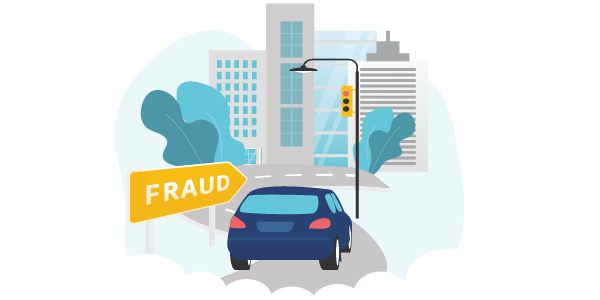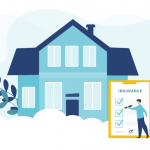All About Auto Insurance Fraud—and How to Protect Yourself
May 2, 2024

Auto Insurance-related scams are a widespread problem across Canada. But fraud impacts more than just the victims and insurance companies—it affects everyone on the road by driving up insurance costs. Fraudulent claims result in more money being paid out by insurance companies, which leads to increased premiums in order to cover these losses. In fact, Auto Insurance fraud is estimated to cost Canadians over $1 billion per year in added premiums.

Nobody wants to pay more for Auto Insurance. So how can you do your part to combat fraud? As a driver, it’s a good idea to learn the signs of Auto Insurance fraud and protect yourself from becoming a victim. Keep reading to find out more about what exactly counts as fraud, and how to avoid the most common types of scams!
What is Auto Insurance fraud?
To put it simply, insurance fraud is the act of deceiving an insurance company for financial gain—whether it’s intentional or not. If caught, you could have your claim denied and your policy cancelled, not to mention the fact that you may face trouble finding future coverage at a reasonable cost. Fraud is considered an offence in the Criminal Code of Canada, with serious consequences if convicted.
When it comes to Auto Insurance fraud, there are two main types to be aware of:
- Premeditated fraud is when someone misrepresents themselves on an insurance application to secure lower premiums (e.g. misidentifying the primary driver of a vehicle), or makes a false insurance claim for damages or injuries from a staged or non-existent accident.
- Opportunistic fraud is when someone inflates a previously legitimate claim by exaggerating damages or injuries that were not as severe as reported, or that weren’t caused by the accident in question to get more out of the claim payout. For example:
- Reporting prior vehicle damage in a claim for a more recent collision;
- Overstating the extent of injuries incurred in a collision;
- Claiming that a piece of property (e.g. electronics, valuables) was inside your vehicle when it was stolen, when it wasn’t.
How can I prevent Auto Insurance fraud?
1. Be wary of staged collisions.
A staged collision is when a driver intentionally causes a collision with an unsuspecting car on the road, typically with the goal of committing insurance fraud. These collisions are usually staged in a way to make the innocent driver appear as though they are at-fault for the accident. Examples include:
- A driver brakes very suddenly, causing the innocent driver behind them to rear-end the vehicle.
- A driver motions for an innocent driver exiting a parking lot onto the road to merge ahead of them, then accelerates to rear-end the vehicle.
Often, organizers of staged collisions may also be working with tow truck drivers, witnesses, or even medical clinics to provide false records and profit from the insurance claim payout.
As you’re driving on the road, take note to avoid cars who seem to be following too closely, displaying unnatural driving behaviours, or waving you in unnecessarily—especially if there are multiple adults in the same vehicle. Leave ample distance between you and the cars surrounding you whenever possible, and don’t drive distracted.
RELATED: Collision vs. Comprehensive Insurance: What’s the Difference?
2. Stay alert on the scene.
If you’re involved in an accident that could potentially be a staged collision, stay extra vigilant. Take lots of photo evidence and document as much information as possible, including a description of the driver and any convenient witnesses (including passengers) who seem to back up the other driver’s account of events. As with any car accident, you should also be taking down their contact details, insurance information, license number, and vehicle registration.
Be cautious of taking recommendations from anyone on the scene to use a specific tow truck company, body shop, or medical clinic, especially if it feels like you’re being pressured—there’s a chance that whoever they’re suggesting could be their collaborators in the insurance fraud scam.
If you suspect that you’re being scammed, contact the police right away, no matter how minor the incident. Avoid signing any documents or accepting a cash settlement on the spot, and always notify your insurer that you’ve been involved in an accident, even if you don’t end up filing a claim for it.
RELATED: Only 50% of Canadians Know What to Do After a Car Accident: Do You?
3. Use trusted service providers.
Imagine this: you’re at the scene of an accident, and the tow truck driver called by the other driver arrives. They recommend towing your car to a nearby body shop. The tow truck driver gets paid a commission from the body shop for bringing in your car. There, the mechanic keeps claiming to find more urgent issues with your car, looking to upsell you on additional repairs, costing both you and your insurance company more money.
To avoid this, be sure to go to reputable professionals that you know or that have been referred to by someone you trust. Keep a record of all the receipts, itemized bills, and statements to ensure that they’re accurate and only include the services that you actually required and received. Pay close attention to any forms and documents that you’re asked to sign.
RELATED: How Does Your Claims History Affect Your Home & Auto Insurance?
4. Report suspicious activity.
If you’re a victim or if you suspect an instance of auto fraud, whether it’s an individual or a group, don’t hesitate to report it. Make sure that you have all your documentation and evidence on hand and contact your insurance company and the police. You can also file a complaint with the Insurance Bureau of Canada. This way, you’ve played your role in preventing fraudsters from targeting more innocent victims.
RELATED: Car Theft Surges in Canada: Are You Covered?
5. Understand your Auto Insurance policy.
The best defense against Auto Insurance fraud is to understand the specific details of your coverage. Take the time to fully read through your Auto Insurance policy to understand exactly what’s covered and what isn’t.
Always be honest with your insurer. Don’t purposely provide false information or paperwork—and if you’re ever unsure about anything, just ask! It’s also in your insurance company’s best interest to prevent fraud, since they’re the ones paying out claims.
RELATED: 5 Advantages of Using an Independent Insurance Broker
Insurance fraud isn’t a victimless crime; it costs all drivers in the form of higher insurance premiums. Always stay vigilant of your surroundings, and trust your instincts. If something doesn’t seem right, consider all the details to determine if you could be experiencing a scam. But remember: Auto Insurance fraud prevention isn’t just about avoiding scams—it’s also about being honest and truthful when applying for insurance and submitting claims.
Need advice on all things Auto Insurance? PROLINK is here for you! Our experienced team of advisors can help you review your Auto policy, clear up any grey areas, and advocate for you in case you need to file a claim. And if you’re in search of a new policy, we’ll survey the market on your behalf and help you compare your options. With over 40 years in business and access to a wide network of over 30 insurance providers, we’ve seen it all—and we know how to get you the right coverage, from the right insurer, at the right price.
To learn more, connect with PROLINK today!
PROLINK’s blog posts are general in nature. They do not take into account your personal objectives or financial situation and are not a substitute for professional advice. The specific terms of your policy will always apply. We bear no responsibility for the accuracy, legality, or timeliness of any external content.




